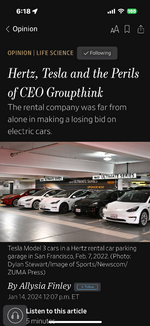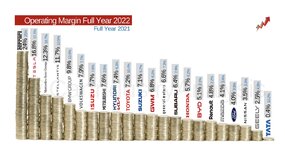From Saturday’s Wall Street Journal:

Hertz announced to much fanfare on Oct. 25, 2021, that it planned to buy 100,000 Tesla s. “Electric vehicles are now mainstream, and we’ve only just begun to see rising global demand and interest,” then-CEO Mark Fields said. The share prices of both companies popped, and Tesla’s market capitalization surged past $1 trillion, exceeding the valuations of nearly all traditional automakers combined.
C-suite executives praised the announcement. “Kudos to Mark Fields and the Hertz team for steering a great American brand into the electric and connected future,” Ford CEO Jim Farley tweeted. Hertz had emerged from Chapter 11 bankruptcy only a few months earlier. It was betting on electric vehicles to power its revival.
Over the next year, Hertz announced plans to buy up to 65,000 Polestars and 175,000 electric vehicles from General Motors . Hertz featured Tom Brady in ads renting an EV. “Knowing Hertz is leading the way with their electric fleet speaks to how the world is changing and the way companies are approaching being environmentally and socially conscious,” the legendary quarterback proclaimed.
The market has changed. Electric-vehicle euphoria has crashed into reality, and Hertz’s bet has gone south. On Jan. 11 the rental-car giant announced it would sell roughly a third of its global EV fleet and use the proceeds to buy gasoline-powered cars. The cited reasons: weak demand for EVs and high repair costs.
Readers might have heard that lower maintenance costs are a major electric-vehicle advantage. As Hertz discovered, the opposite it true. Even minor accidents can require batteries to be replaced, which can cost $20,000. Many EV parts aren’t readily available, so cars have to sit in the shop for weeks.
The bigger problem is that Americans don’t want to plan trips around the locations of electric-vehicle charging stations—often to discover later that the chargers are broken. Nor do they want to download multiple apps to charge at different stations, or worry about their battery range degrading in cold temperatures.
These are the same reasons most Americans haven’t warmed up to electric cars. A Deloitte Global Automotive Consumer Survey last week found that 67% of U.S. consumers said they would prefer an internal-combustion engine for their next vehicle purchase. Only 6% said they favored a battery-powered EV—down from 8% last year.
Electric vehicles simply aren’t practical for most Americans and won’t go mainstream until they are. This inconvenient truth has finally dawned on corporate execs and investors who were drinking the same punch as Hertz in 2021.
Traditional automakers had committed to spend tens of billions of dollars on EVs. Startups such as Lucid , Nikola , Lordstown and Rivian debuted on public stock exchanges with fantastic market valuations despite having produced few if any cars. Rivian in early November 2021 boasted a $153 billion market cap. It’s now worth $17.3 billion.
As demand for electric vehicles stalled, the buzz wore off. The auto industry and investors are now suffering from a horrible hangover.
In recent months, traditional automakers have rolled back electric-vehicle production plans as they beg the Biden administration to tap the brakes on its aggressive EV mandate. Ford reported a $7.4 billion write-down on its Rivian stake in 2022. General Motors’ planned investment in Nikola burst into flames, as the startup’s semi trucks have been prone to do.
“There’s a lot of excitement around the early adopters,” Mr. Fields told CNBC in October. “Now you’re getting to the tough part of mass adoption.” Never mind that only two years earlier, investors and automakers believed EVs were already “mainstream.”
The EV reversal illustrates the perils of groupthink, which has infected the C-suite and Wall Street just as it has college campuses. Ideological conformity has fueled the ESG (environmental, social and governance) and DEI (diversity, equity and inclusion) movements in corporate America, which have proved costly and distracting.
It prompted CEOs of companies such as Coca-Cola and Delta to denounce Georgia’s 2021 voting-integrity law even though many didn’t know what was in it. It contributed to financial turmoil last spring because banks had piled into long-dated securities, assuming low interest rates would last forever. Then they had to record steep losses when rates rose.
The public’s dummy lights should flash when CEOs and Wall Street sing from the same hymnal. The same choir that proclaimed inflation would be “transitory” is now predicting a “soft landing.” Perhaps. But planes often smoothly descend from 35,000 to 5,000 feet, only for things to turn bumpy as they approach the runway.
Source URL:
The rental company was far from alone in making a losing bid on electric cars.

www.wsj.com
GSXR edit: Paywall bypass here.

















